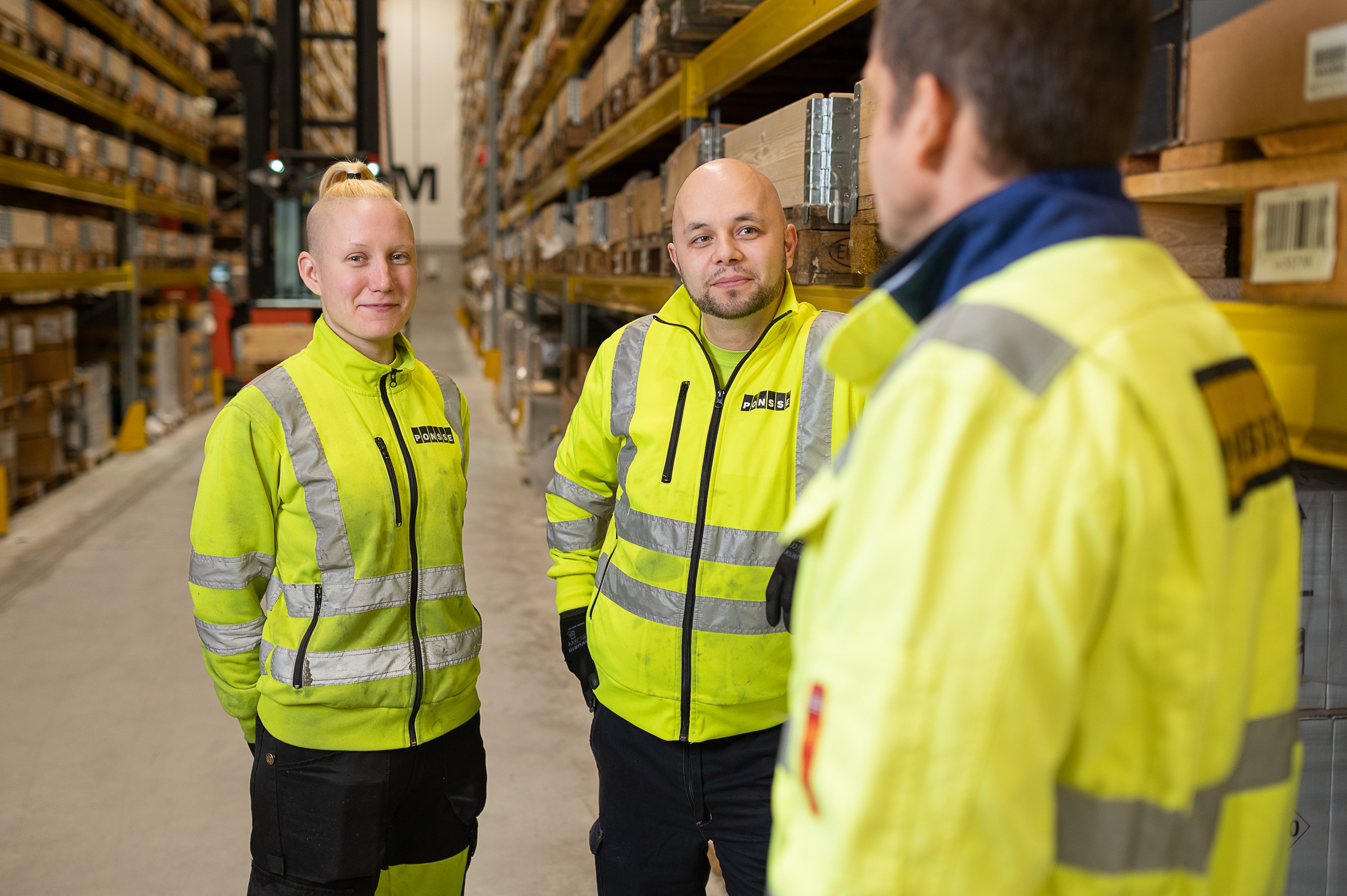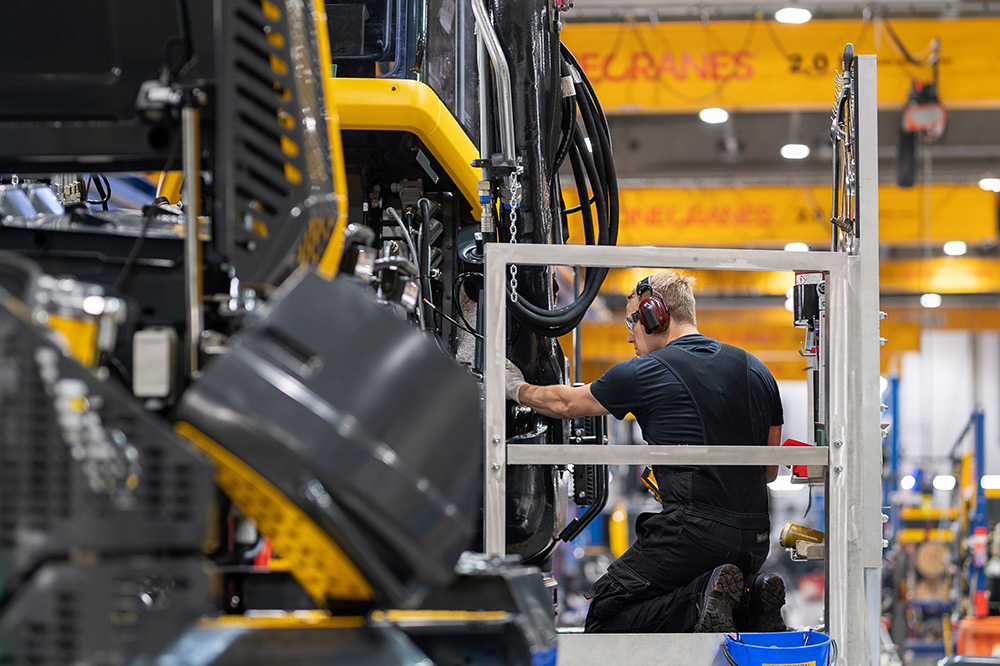- Knowing our environmental impacts and working systematically to reduce them
- Carbon neutral operations and solutions
During 2022, we investigated opportunities and measures to reduce emissions, based on which we prepared our carbon neutrality roadmap. Our emissions reduction goals cover Scope 1 and 2 emissions (our operations and purchased energy).
The majority of our carbon footprint is produced by vehicle use (58% in 2021), followed by purchased heating (15% in 2021) and the fuel consumption of our work equipment and forest machine test drives (13% in 2021). Geographically speaking, the highest emissions in 2021 were generated by our operations in Finland (33%), Russia (20%), and the USA (18%). Epec Oy, the group’s technology company, only produced 1.23 t CO2-eq in emissions.
We will also define which Scope 3 emissions are relevant for our operations (product end use, component procurement, etc.). We aim to include Scope 3 emissions in our calculations at the beginning of 2024. During 2022, we identified the company’s most significant Scope 3 emission categories and will define a data collection and reporting policy for the calculation in 2023.

Key goals of procurement include the efficient circulation of stocks and the optimal availability of materials. This helps us keep our stock levels and needs for facilities and resources moderate and avoid material waste. The most significant environmental impact of our procurement and logistics is associated with steel manufacturing for PONSSE forest machines and the transport of components. Steel and castings combined make up a significant part (82%) of the weight of forest machines. We calculate and dimension machine structures in our research and development operations by optimising the use of steel and castings based on product loads. Forest machines have a recycling rate of 97%.
We have kept our environmental impact and other procurement risks under management by centralising our procurement in Europe and especially in Finland. Of Ponsse’s material suppliers and subcontractors, 74% are located in Finland (2021: 73%) and 23% in other EU states(2021: 22%). Ponsse exercises no significant direct sourcing from low-cost countries. In addition to Finland, the most technologically challenging and expensive components for PONSSE forest machines are sourced from Germany and Sweden.
Environmental impact of transport
A total of 47% of our subcontracted purchases (EUR) and 21% of all our procurement (subcontracting and purchased components) take place within a 25-kilometre radius from our production. Our subcontractors are mainly based in the partnership business park located in the immediate vicinity of our factory in Vieremä. This significantly reduces transport emissions and enables joint transport operations between our production and our subcontractors.
We seek to control the environmental impactof transport by improving the efficiency of transport operations and developing packaging solutions. As many as 90% of our transport partners report their carbon footprint to us, allowing us to prepare for expanding our emissions reporting to Scope 3 emissions.
Recycling of packaging material
We recycle packaging material between our material suppliers in Finland and Ponsse. Packaging design, recycled packaging and transportation stands designed for PONSSE components have reduced not only the use of packaging material, but also damage to parts. Furthermore, they have improved the transport efficiency rate. To enhance return logistics, recycled packaging for large products can be folded.
We mainly use standard reusable pallets in our deliveries and transfer disposable pallets for chipping and further for the generation of district heating in Vieremä. Otherwise, we see to our producer liability by delivering our production packaging to a recycling partner, which forwards the material for recycling or use as energy.

Production accounts for one third of Ponsse’s carbon footprint. Our production’s environmental impacts are related to energy and raw material consumption, the use of chemicals, and solvent emissions from surface treatments. We use certified hydropower for our production.
Water is used in our production processes only for washing pieces before surface treatment and washing machines after test drives, which also prevents the spread of invasive species. In surface treatment, we minimise water consumption by reusing water several times.
In 2022, water consumption in our production increased by 6% from the previous year to 15,906 m³ (2021: 14,946 m³).During the year 2022, our total water consumption was 29,680 m³, down by 7% from the previous year.
A carbon neutral factory by 2025
In 2022, the carbon footprint of Ponsse Group’s factories was 259 t CO2-eq, representing a decrease of 4% compared to the previous year. We have reduced the carbon footprint of our factories by 90% compared to 2019 by purchasing electricity produced with guarantee-of-origin renewable energy, using district heating mainly produced with renewable energy sources and by transitioning to the use of renewable diesel (HVO).
At the factory, we fill finished forest machines with light fuel oil or diesel fuel, according to the requirements of the customer and the country of destination. We have exclusively used renewable diesel in our production since 2020. Post-production machine testing produces emissions during transport and test drives due to fuel and oil consumption.
Carbon neutrality in the Nordic countries by 2035
In addition to production operations, this goal covers maintenance services in the Nordiccountries. Besides Finland, Ponsse operates in the Nordic countries through its subsidiaries in Sweden and Norway. In 2022, our carbon footprint in the Nordic countries decreased by 7% to 1,931 t CO2-eq. Compared to 2019, we have reduced our carbon footprint in the Nordic countries by 62% by shifting to the use of enery generated using renewable and carbon neutral (Scope 2) energy sources.
The group's carbon footprint down by 55% by 2035
The carbon footprint will be compared to emission levels in 2022. In practise, this translates to emissions reductions of roughly 5% per year. In 2022, Ponsse’s carbon footprint in the Nordic countries decreased by 1% to 4,310 t CO2-eq. Compared to our initial carbon footprint calculated in 2019, our carbon footprint is now 38% smaller.
